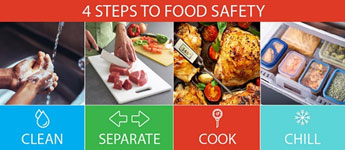Food Safety in the Summer
Grilling is one of our favorite summertime activities because it is a great way to bring people together, but it is also versatile in that you can grill pretty much anything from meat, vegetables, and even fruit! Grilling gives food a wonderful flavor, requires little equipment, and is easy to do with a few things to remember.
As grilling season is upon us it is important to keep your food and guests safe and free from food borne illnesses during barbeque cookouts. The risk of food borne illness actually increases during summer months because the hot and humid days of summer provide the perfect environment for bacteria to grow quickly.
The best way to reduce your risk of food borne illness during barbeques is to remember the four steps to food safety.

(Image: FoodSafety.gov)
Step 1:
The first step to grilling anything is to wash your hands and make sure you have clean counters and workspace. It is important to remember to always rinse fruits and vegetables before preparing, but NEVER rinse meat, poultry, or seafood as this can increase your risk of spreading bacteria to other surfaces nearby.
Step 2:
When shopping and transporting food, keep your meat, poultry, and seafood separate from other produce to reduce the risk of leaking juices cross contaminating your other food and utensils. It is best to put raw meat, poultry, and seafood in individual plastic bags when purchasing and transporting. Remember to wash all surfaces and utensils that come into contact with raw juices. It is especially important to remember to use a clean plate or platter for removing cooked meat off the grill to not contaminate the cooked food.
It may be tempting to thaw meat, poultry, or fish on the counter, but you should ALWAYS thaw it in the refrigerator and never at room temperature. If you are using a marinade, always marinate food in the refrigerator no matter what type of marinade you are using. Discard any marinades or sauces that came into contact with raw meat juice to prevent cross contamination.
Step 3:
Now that you have prepped your food you are ready to cook. When cooking, always use a food thermometer to check the internal temperature of food. Even though the outside may be brown and nicely grilled, the inside may not be fully cooked. Refer to the chart for safe internal cook temperatures. If cooking with a smoker, keep the inside of the smoker between 225°F and 300°F.
Minimum Internal Temperature |
Product |
| 145°F | Whole cuts of beef, pork, lamb, ham (fresh or smoked uncooked) and veal [Note: allow to rest at least 3 minutes before slicing and serving] |
| 145°F | Fish (or cook until the flesh is opaque and separates easily with a fork) |
| 160°F | Hamburgers and other ground meat like pork |
| 160°F | All poultry (including ground poultry), pre-cooked meats (like hot dogs), casseroles, and leftovers |
If transporting food, keep cold food 40°F or below using an insulated cooler with ice packs. Once food is cooked, keep it hot above 140°F.
Step 4:
Lastly, do not let food sit out for more than two hours, or one hour if the temperature is 90°F or higher. Keep food cold until you are ready to grill and refrigerate or freeze any leftovers within that same timeframe to prevent bacteria from multiplying. Hot food can be divided into smaller containers and placed in refrigerator to help chill them faster.
Contact us at foodhelp@jocogov.org with all your food safety and grilling questions!
Subscribe to our In Good Health monthly newsletter
We will send you more tips and tricks and recipe ideas for safe and healthy living.